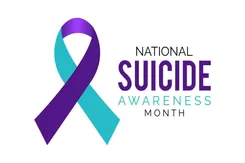
Talking About Suicide with Your Teen: A Guide for Parents
September is Suicide Awareness Month, a time for us to come together as a community to raise awareness, share stories, and foster open conversations about mental health and suicide prevention.

First, let’s dispel a myth…Talking about suicide does not increase the risk; in fact, it can reduce it. Conversations about mental health and suicidal thoughts can provide relief and encourage others to seek help. If your child is struggling, letting them know it’s okay to talk about their feelings can be a critical step toward healing.
Here’s a guide to help you navigate this important dialogue with empathy and understanding.
Why It Matters & How to Talk About It
Suicide is a leading cause of death among teenagers, and many struggle with feelings of hopelessness or despair. By initiating conversations about mental health and suicide, you can help your teen feel safe to express their feelings and seek help if needed.

1. Choose the Right Time and Place
Select a comfortable, private setting where your teen feels safe. This could be during a quiet moment at home or while doing an activity together. The goal is to create an environment where they can talk openly without distractions or interruptions.
2. Start with Open-Ended Questions
Begin the conversation with open-ended questions to encourage your teen to share their thoughts and feelings. You might say:
- “I’ve noticed you seem a bit down lately. Do you want to talk about it?”
- “How are you feeling about everything going on at school or with friends?”
This approach allows your teen to express themselves without feeling pressured.

3. Listen Without Judgment
When your teen opens up, listen attentively. Validate their feelings by saying things like:
- “It’s okay to feel this way.”
- “I’m here for you, and I want to understand what you’re going through.”
Avoid jumping to conclusions or offering immediate solutions. Sometimes, just having someone listen can provide immense relief.
4. Be Honest About Your Concerns
If you suspect your teen is struggling, it’s essential to express your concerns directly but gently. You might say:
- “I care about you, and I’ve been worried about how you’ve been feeling.”
- “If you’re ever feeling overwhelmed or hopeless, please know you can talk to me about it.”

5. Introduce the Topic of Suicide
If the conversation naturally leads there, don’t shy away from discussing suicide. You can frame it as a way to understand their feelings better:
- “Some people feel so overwhelmed that they think about hurting themselves or ending their life. It’s a serious topic, but I want you to know that it’s okay to talk about it.”
6. Normalize Seeking Help
Let your teen know that seeking help is a sign of strength. Share information about mental health resources, such as counselors or hotlines. You might say:
- “Talking to someone who can help can really make a difference. It’s completely okay to ask for help.”
7. Encourage Ongoing Dialogue
Make it clear that this isn’t a one-time conversation. Let your teen know you’re always available to talk:
- “I want you to feel comfortable coming to me whenever you need to talk, no matter how big or small the issue.”

8. Know the Signs of Crisis
Familiarize yourself with the warning signs that may indicate your teen is in crisis, such as drastic changes in mood, withdrawal from friends, or expressions of hopelessness. If you believe they are in immediate danger, do not hesitate to seek help right away.
9. Take Care of Yourself, Too
These conversations can be emotionally taxing for you as well. Make sure to take care of your own mental health and seek support when needed.
How to Reach Out
If your teen is in crisis, or if you’re concerned about a friend of theirs, it’s vital to know that help is available. Here are some key resources:
- OC Links. Call 855-OC-LINKS (855-625-4657). OC Links provides 24/7 information and linkage to mental health services, including crisis response.
- NAMI OC WarmLine. Call or text: 714-991-6412. The NAMI OC WarmLine is a free and confidential telephone service providing emotional support and resources (Orange County residents only).
- National Suicide Prevention Lifeline: Call 998 or 1-800-273-TALK (1-800-273-8255). This 24-hour, toll-free, confidential suicide prevention hotline is available to anyone in suicidal crisis or emotional distress. It provides Spanish-speaking counselors, as well as options for deaf and hard-of-hearing individuals for 24/7 support from trained counselors.
- Crisis Text Line: Text “HOME” to 741741 for free, confidential support via text message, available 24/7.
- Trevor Project (for LGBTQ+ youth): Call 1-866-488-7386 or text “START” to 678678 for crisis intervention and suicide prevention support.
Conclusion
Talking to your teen about suicide can be scary, but your support and understanding can have a significant impact. By creating an open, supportive environment, you can help your teen feel safe sharing their feelings. If you or your teen ever need immediate help, don’t hesitate to reach out to a mental health professional or contact a crisis hotline. Remember, you are not alone in this journey—many resources are available to assist you and your family.
Please consider sharing this blog with others, engaging in open conversations with your teens, or checking in on their friends. Each step we take towards awareness and understanding brings us closer to a world where our children feel they belong and are supported.
